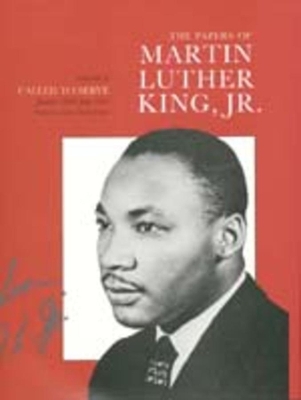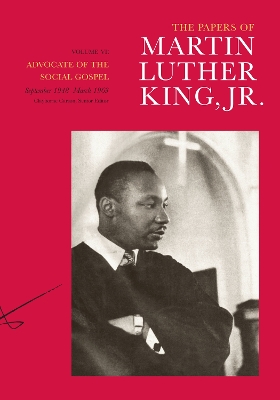Martin Luther King Papers
2 primary works
Book 1
More than two decades since his death, Martin Luther King, Jr.'s ideas - his call for racial equality, his faith in the ultimate triumph of justice, and his insistence on the power of nonviolent struggle to bring about a major transformation of American society - are as vital and timely as ever. The wealth of his writings, both published and unpublished, that constitute his intellectual legacy are now preserved in this authoritative, chronologically arranged, multi-volume edition. Faithfully reproducing the texts of his letters, speeches, sermons, student papers, and articles, this edition has no equal. Volume One contains many previously unpublished documents beginning with the letters King wrote to his mother and father during his childhood. We read firsthand his surprise and delight in his first encounter (during a trip to Connecticut) with the less segregated conditions in the North. Through his student essays and exams, we discover King's doubts about the religion of his father and we can trace his theological development.
We learn of his longing for the emotional conversion experience that he witnessed others undergoing, and we follow his search to know God through study at theological seminaries. Throughout the first volume, we are treated to tantalizing hints of his mature rhetorical abilities, as in his 1945 letter to the Atlanta Constitution that spoke out against white racism. Each volume in this series contains an introductory essay that traces the biographical details of Dr. King's life during the period covered. Ample annotations accompany the documents. Each volume also contains a chronology of key events in his life and a "Calendar of Documents" that lists all important, extant documents authored by King or by others, including those that are not trnascribed in the document itself. The preparation of this edition is sponsored by the Martin Luther King, Jr. Center for Nonviolent Social Change in Atlanta with Stanford University and Emory University.
We learn of his longing for the emotional conversion experience that he witnessed others undergoing, and we follow his search to know God through study at theological seminaries. Throughout the first volume, we are treated to tantalizing hints of his mature rhetorical abilities, as in his 1945 letter to the Atlanta Constitution that spoke out against white racism. Each volume in this series contains an introductory essay that traces the biographical details of Dr. King's life during the period covered. Ample annotations accompany the documents. Each volume also contains a chronology of key events in his life and a "Calendar of Documents" that lists all important, extant documents authored by King or by others, including those that are not trnascribed in the document itself. The preparation of this edition is sponsored by the Martin Luther King, Jr. Center for Nonviolent Social Change in Atlanta with Stanford University and Emory University.
Book 6
Dedicated to documenting the life of America's best-known advocate for peace and justice, "The Papers of Martin Luther King, Jr." breaks the chronology of its series to present King's never-before-published sermon file. In 1997 Mrs. Coretta Scott King granted the King Papers Project permission to examine papers kept in boxes in the basement of the Kings' home. The most significant finding was a battered cardboard box that held more than two hundred folders containing documents King used to prepare his celebrated sermons. This private collection that King kept in his study sheds considerable light on the theology and preaching preparation of one of the most noted orators of the modern era. These illuminating papers reveal that King's concern about poverty, human rights, and social justice was clearly present in his earliest handwritten sermons, which conveyed a message of faith, hope, and love for the dispossessed.
His enduring message can be charted through his years as a seminary student, as pastor of Dexter Avenue Baptist Church, as a leader of the Montgomery bus boycott, and, ultimately, as an internationally renowned proponent of human rights who saw himself mainly as a preacher and 'advocate of the social gospel.' Ten of the original and unedited sermons King submitted for publication in the 1963 book "Strength to Love" and audio versions of King's most famous sermons are the culmination of this groundbreaking work.
His enduring message can be charted through his years as a seminary student, as pastor of Dexter Avenue Baptist Church, as a leader of the Montgomery bus boycott, and, ultimately, as an internationally renowned proponent of human rights who saw himself mainly as a preacher and 'advocate of the social gospel.' Ten of the original and unedited sermons King submitted for publication in the 1963 book "Strength to Love" and audio versions of King's most famous sermons are the culmination of this groundbreaking work.

